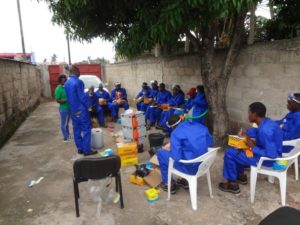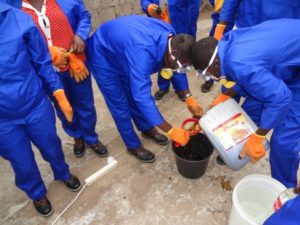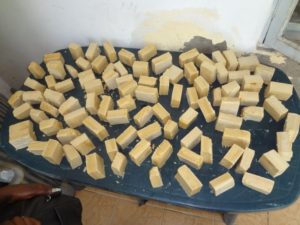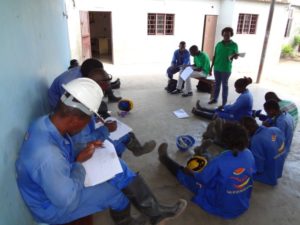During the month of March 2019, AMOR carried out the following activities:
Training on Handmade Soap Production
The first training session on handmade soap production took place in the KUTENGA association, which involved members of three micro-enterprises of primary solid waste collection, namely: ASSCODECHA, KUTENGA and MAKTEL BACISSA. This soap is made by recycling used cooking oil (from residences and / or restaurants). This is an innovative action that was developed to give ecological destination to used cooking oil, which would eventually be disposed of in the environment inappropriately, causing pollution, especially from the water. This activity is included in the package of training provided to micro-enterprises with the aim of enabling them for the recovery and transformation of waste. The trainees also benefited from an HST lecture focusing on the use of Personal Protective Equipment (PPE).
The trainees also benefited from an HST lecture focusing on the use of Personal Protective Equipment (PPE). Before starting the process of manufacturing handmade soap it is necessary to take some safety measures, since some chemicals (splashes or inhalation of sodium hydroxide – NaOH) are handled which, in contact with the unprotected individual, can cause:
- Severe burns and complete perforations of mucosal tissues of the mouth, esophagus and stomach
- Damage to the respiratory tract and lung tissue, causing chemical pneumonia, depending on the severity of the exposure,
- Destruction of eye tissues through contact and severe burns resulting in eye damage and even blindness.
This makes it necessary to use PPE made up of a protective uniform (pants and shirt), boots, gloves, mask with air filter and glasses.
2. Baseline Questionnaire
The line questionnaires covered three associations or micro-enterprises for the primary collection of solid waste, namely ASSOCEDECHA, MAKTEL BACISSA and KUTENGA, which operate, in order, in the districts of Chamanculo C, Hulene A and Maxaquene B ..
A total of 46 members were surveyed, including 3 managers, 2 deputy managers and 41 waste collection operators. In general, it was intended to know the characteristics of the associations and to evaluate the level of knowledge they already have and the impact of the implementation of the project activities in the associations.
The associations have a body of solid waste collection operators composed mainly of men, of the 42 interviewees, 33 are males, 79% and 9 females, which corresponds to 21% of the total. It can also be verified that the most predominant age group is from 26 to 30 and 31 to 35 years, which together represent 55%.
In the knowledge component on selective collection infrastructures or ecopoints, handicrafts, soap and charcoal formations, it can be seen that AMOR has exerted a great influence on the members of these associations, they have acquired knowledge and developed reuse skills (taking advantage of the material collected in the neighborhoods) to make various handicraft articles (drainage, decoration of bottles, paper baskets, etc.). It has also learned to value waste by means of the selective collection and destination of the existing recycling rows at the municipality level of Maputo.
3. Monitoring the Operation of the Ecopoints
From AMOR’s monitoring of the three ecopoints under the responsibility of the ASSCODECHA, KUTENGA and MAKTEL BACISSA micro-enterprises, a total of 547.5 kg of recyclable solid waste was collected, which represents an increase in the order of 77% of the amount of recyclables , taking into account that in January and February 309.5kg of recyclable waste was collected.







